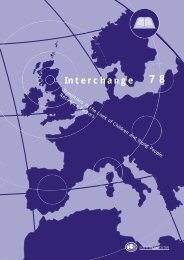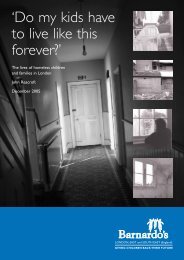Splintered Lives - Barnardo's
Splintered Lives - Barnardo's
Splintered Lives - Barnardo's
You also want an ePaper? Increase the reach of your titles
YUMPU automatically turns print PDFs into web optimized ePapers that Google loves.
were drawn from a local community, and had been carefully cultivated. Investigation<br />
resulted in "... a list of 30-40 boys who needed interviewing within 36 hours" (p15). The<br />
police/social work team set internal groundrules, agreeing that where a conflict of<br />
interest emerged between evidence gathering and child protection it would be referred<br />
up to a high level. Many of the interviews took place in settings where the young men<br />
felt comfortable. Discussions within team involved definitions; were they going to<br />
define 18 year olds, 16-17 year olds as victims, since this was possible in law due to the<br />
inequality in the age of consent regarding male homosexual acts. The police made an<br />
early decision to resource a large operation rather than go for quick arrests; the<br />
'operation' cost £397,000. The local SSD allocated nine staff to the team, and<br />
considerable overtime. This in turn had considerable consequences for social work<br />
teams maintaining the ongoing case load.<br />
As a consequence of this and other cases, Redding floats a proposal that has some<br />
support within SSDs of a London wide investigation squad with seconded police and<br />
social workers, which could be both reactive and pro-active. How the rest of Britain is to<br />
develop appropriate responses to these kinds of cases is not addressed.<br />
In relation to child pornography British legislation current outlaws production,<br />
distribution and possession. However, as Nick Davies (1994d) has made clear the<br />
resources have never been allocated within the police to implement and enforce this.<br />
OPS have developed ways of tracking producers and users of computer child<br />
pornography, but the work is labour intensive requires particular skills; they currently<br />
have two staff and one computer working on it. Until October 1994, despite John<br />
Major's pledge a year earlier to prioritise work in child pornography, OPS was uncertain<br />
of its future. Whilst a policy decision to retain OPS was made, it's remit was confined to<br />
child pornography and large scale organised abuse cases. This will mean virtually noone<br />
will be responsible for enforcement of legislation with regard to adult pornography.<br />
OPS has grown from six staff in the late 1980s to 14 officers, three managers and civil<br />
support staff. They currently have on file 3-4000 known 'paedophiles', many of whom will<br />
be suspected of involvement in various forms of child pornography and child<br />
prostitution. The unit can only manage 100 investigations at anyone time. Michael<br />
Hames commented on the importance of sexual exploitation within the police force:<br />
"efforts couldn't be any less than they are now". For there to be a concerted and<br />
informed response in Britain a re-allocation of resources needs to occur within the<br />
police force, and alongside this training of regional squads in order that<br />
investigations/tracking can be done locally. OPS could then become a more specialized<br />
unit providing consultancy, collation of national data, and international networking/cooperation.<br />
How such squads would work in partnership with other agencies who have a<br />
statutory role in child protection requires thoughtful reflection. Without seconded<br />
workers who are enabled to develop the skills needed, the police will inevitably become<br />
the lead agency in all such cases.<br />
PAGE 69<br />
chapter<br />
11
















